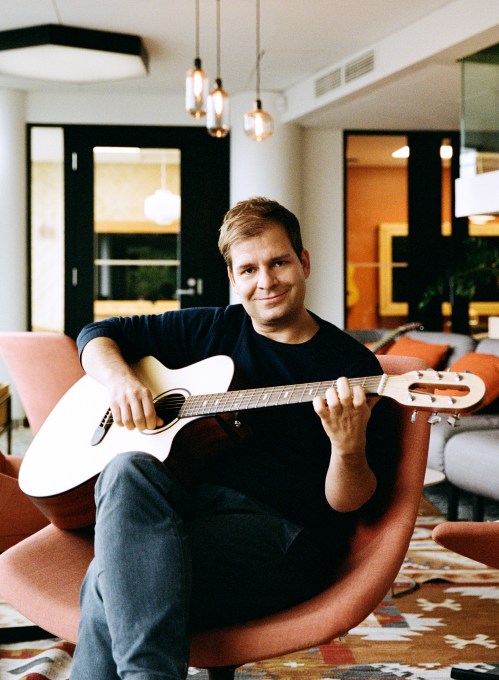By his own admission, Chris Thür wasn’t the most obvious person to start a music education startup.
Thür (previously a laser researcher) recalled an early meeting with an investor who asked whether he and co-founder Mikko Kaipainen (an electrical engineer) were music teachers or musicians, ultimately going “down the list of all the things that would somewhat qualify us for that world.” Each time, they had to tell him no.
“We were just two people who wanted to play an instrument and felt we were missing out,” Thür said. “Obviously, we were not the only ones.”
While they didn’t convince that unnamed investor to write a check, Thür and Kaipainen did start Yousician, which now reaches 20 million monthly users across its two apps — the music education app Yousician and the guitar tuning app GuitarTuna. And the Helsinki-based startup is announcing today that it has raised $29 million in Series B funding.
Thür (Yousician’s CEO) said that it’s been “a bit of a journey” to get here. The company, previously known as Ovelin, was founded a decade ago, and it originally focused exclusively on kids before finding success with a less age-specific strategy.

Yousician CEO Chris Thür
He described the Yousician app as providing an interactive, gamified approach to learning guitar, piano, ukulele, bass or singing — but not too game-like. Users advance through a standard syllabus, playing for 15 or 20 minutes a day, with the app listening to their performance and awarding one to three stars based on how many mistakes they made. Users get one lesson per day for free, but if they want access to more lessons and the full library of songs (or if they want to learn multiple instruments), they need to sign up for a Premium or Premium+ subscription, with pricing starting at $19.99 per month.
Thür said Yousician allows people to learn music on their own schedule, at a much lower cost than in-person lessons. At the same time, he suggested that it’s not a “zero sum” competition with music teachers; there are teachers who recommend Yousician to their students as a way to keep practicing and learning between lessons.
As an example of how Yousician can help its users, Thür pointed to the story of Karen Gadd, who (as told in the video below) “in one year went from never having played an instrument to performing on-stage” with her band — though he hastened to add that the app is beneficial even if you never perform for anyone else.
“We want to make musicality to be as common as literacy,” Thür said. “Everyone should play from time to time and get all those benefits […] I think learning with a teacher works for many, but unfortunately it doesn’t work for everyone.”
The past year, he said, has been “a difficult year and an interesting year for us.” With students largely shifting to remote learning, “a lot of music lessons didn’t happen,” so Yousician tried to make up for some of those lost lessons by providing free premium subscriptions to more than 100,000 teachers and students.
At the same time, many people became interested in learning an instrument during the pandemic as part of a general focus on self-improvement, leading to “a huge organic increase” in usage. Monthly users grew from 14.5 million to 20 million, while subscriptions increased 80%, with the company bringing in revenue of $50 million last year.
Yousician has now raised a total of $35 million. True Ventures led the round, with participation from new investors Amazon’s Alexa Fund and MPL Ventures, as well as Zynga founder Mark Pincus, LAUNCH Fund founder Jason Calacanis, Unity Technologies founder David Helgason, Trivago co-founder Rolf Schrömgens, Cooler Future founder Moaffak Ahmed and Blue Bottle Coffee Company executive chairman Bryan Meehan.
“Yousician has been the leading platform for music instruction for nearly a decade, and people – now more than ever – are turning to the pursuit of creativity and music with renewed vigor,” said True Ventures co-founder Jon Callaghan in a statement. “We’re proud to stand behind a company and team that brings the joy and excitement of playing an instrument into more homes and families.”
Thür said that with the new funding, Yousician will work the team, improve brand marketing, localize the product and build more relationships with musical artists.
Comments
Post a Comment